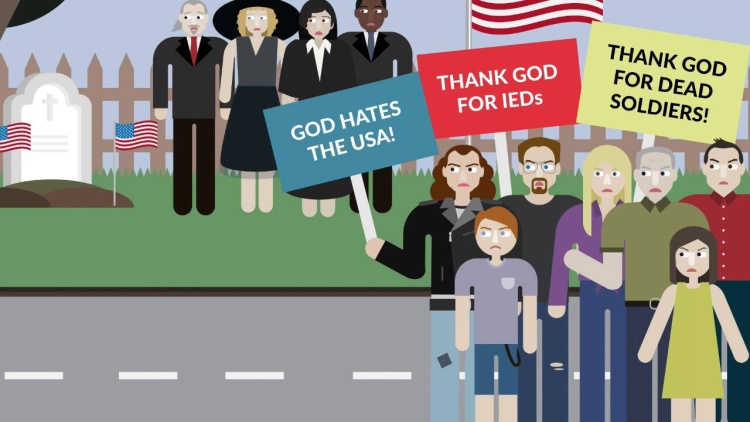Snyder v. Phelps
United States Supreme Court
562 U.S. 443 (2011)
- Written by Craig Conway, LLM
Facts
Fred Phelps (defendant), founder of the Westboro Baptist Church (defendant), organized a picket and protest of a military funeral held in Maryland. Phelps and several members of his congregation stood holding signs outside the Maryland State House, the US Naval Academy, and the church where the funeral took place. The signs bore phrases such as “Thank God for 9/11,” “America is Doomed,” “Thank God for IEDs,” and “Thank God for Dead Soldiers.” Albert Snyder (plaintiff), the father of the fallen soldier, noticed the picketers but could not read the content on the signs. Snyder filed suit against Phelps, the church, and the other protestors (collectively, the protestors) (defendants) in federal district court alleging five state tort-law claims, including intentional infliction of emotional distress (IIED). At trial, it was shown that Phelps had notified local authorities in advance of the protest and had complied with police instructions in staging the demonstration. The protestors occupied a 10-by-25-foot plot of public land approximately 1,000 feet from the church where the funeral was held. There was no evidence of violence, yelling, or other disruptive behavior during the 30-minute protest period before the funeral. Snyder testified that although he did not see what was written on the picketers’ signs, he had suffered severe depression and emotional anguish. A jury found for Snyder on the IIED claim an awarded him $2.9 million in compensatory damages and $8 million in punitive damages. The district court lowered the punitive damages amount to $2.1 million but affirmed the jury’s verdict in all other respects. The protestors appealed. The court of appeals reversed and held that the protest was protected by the First Amendment. The US Supreme Court granted certiorari to review.
Rule of Law
Issue
Holding and Reasoning (Roberts, C.J.)
Dissent (Alito, J.)
What to do next…
Here's why 904,000 law students have relied on our case briefs:
- Written by law professors and practitioners, not other law students. 47,100 briefs, keyed to 995 casebooks. Top-notch customer support.
- The right amount of information, includes the facts, issues, rule of law, holding and reasoning, and any concurrences and dissents.
- Access in your classes, works on your mobile and tablet. Massive library of related video lessons and high quality multiple-choice questions.
- Easy to use, uniform format for every case brief. Written in plain English, not in legalese. Our briefs summarize and simplify; they don’t just repeat the court’s language.





